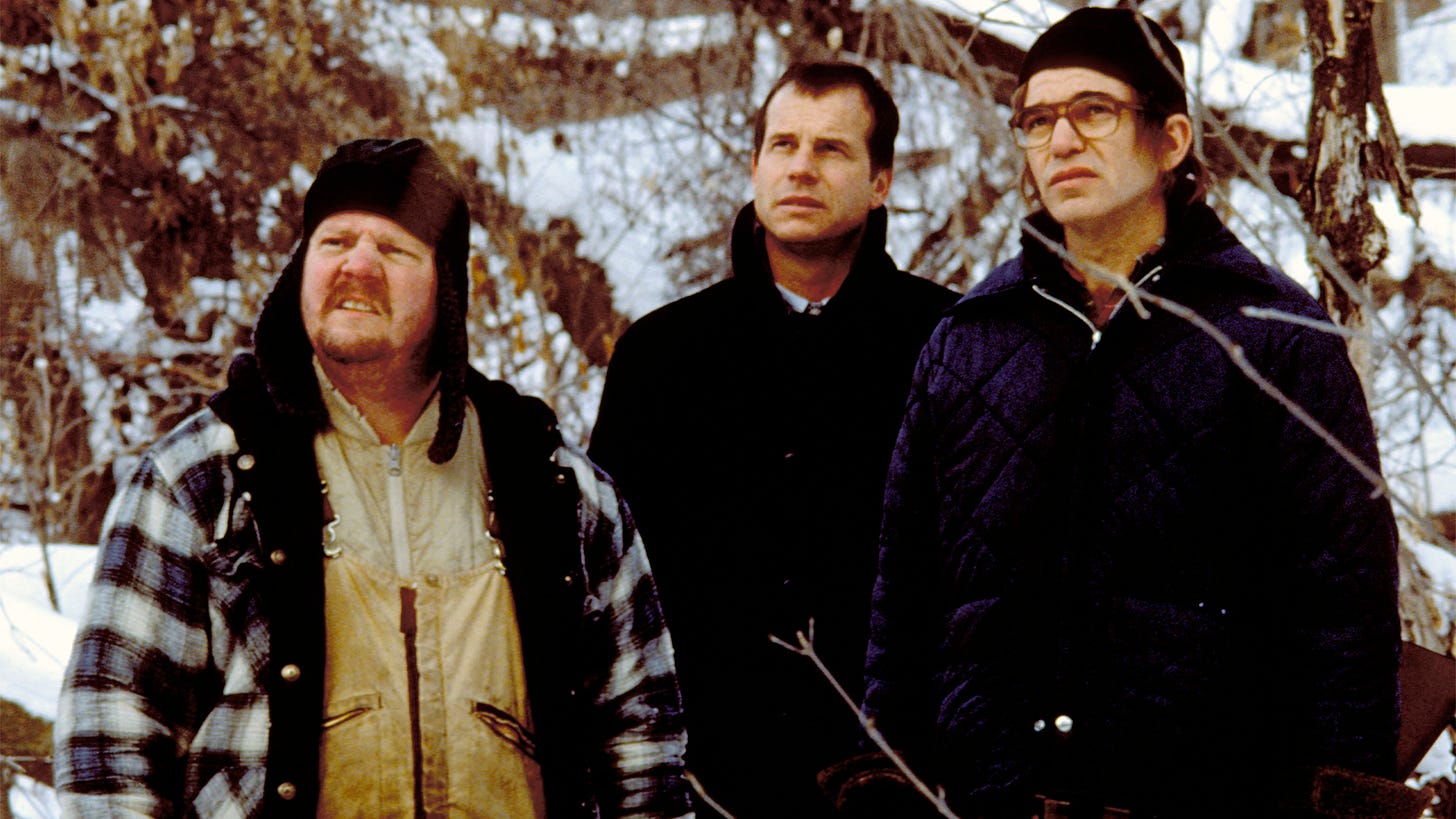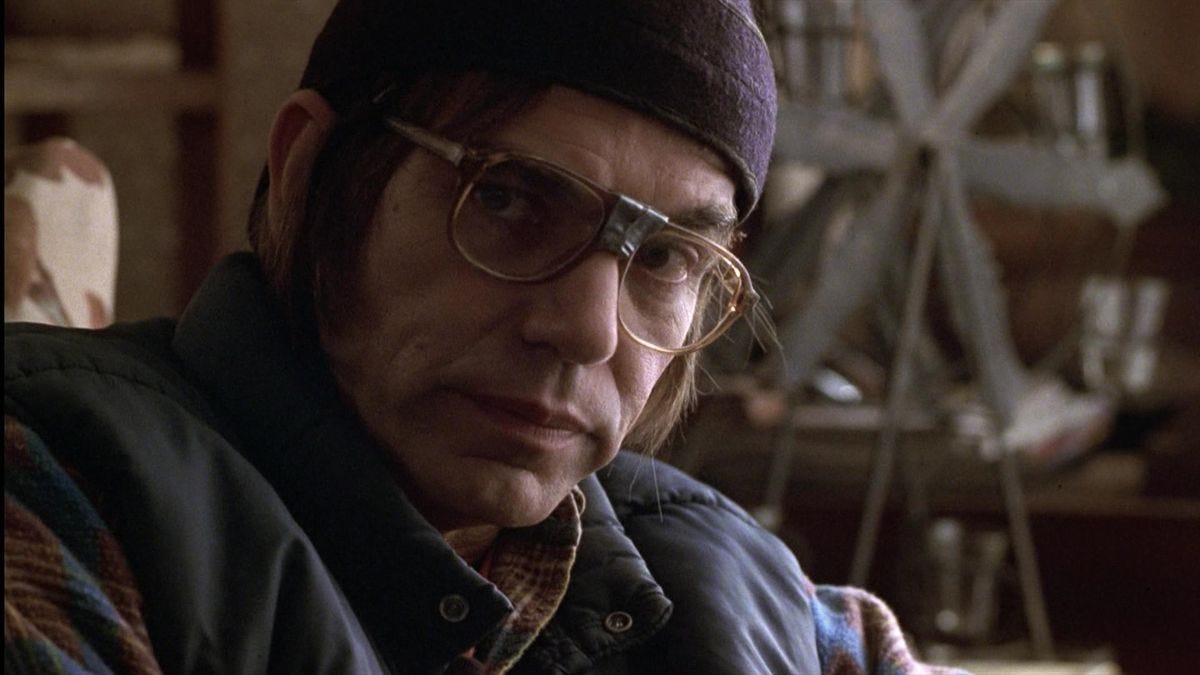'A Simple Plan': When Sam Raimi made his 'Fargo'
Two years after the Coen brothers' neo-noir masterpiece, their friend and early collaborator embarked on his own moral journey through snowbound Minnesota.
There's more to life than a little money, you know. Don'tcha know that? And here ya are, and it's a beautiful day. Well. I just don't understand it. — Marge Gundersson, Fargo
When I was still just a kid, I remember my father telling me what he thought that it took for a man to be happy. Simple things, really. A wife he loves, a decent job, friends and neighbors who like and respect him. And for a while there, without hardly even realizing it, I had all that. I was a happy man. — Hank Mitchell, A Simple Plan
The careers of Sam Raimi and the Coen brothers, Joel and Ethan, were strongly intertwined in the early going, before much of an infrastructure existed to finance and distribute the independent, highly personalized genre films they wanted to make. When they were ramping up in the early-to-mid ‘80s, the sex, lies and videotape revolution hadn’t happened yet, and so most of the era’s low-budget successes wound up creating their own market, like Jim Jarmusch’s Stranger Than Paradise in 1984, Spike Lee’s She’s Gotta Have It in 1986, Raimi’s The Evil Dead and The Evil Dead II in 1981 and 1987, and the Coens’ Blood Simple in 1984. Raimi and the Coens worked directly on 1985’s Crimewave, a by-all-accounts miserable experience for Raimi, who was beset by budget shortfalls, set disasters, and a studio second-guessing him at every turn. By the time they worked together again on 1994’s The Hudsucker Proxy, this time with the Coens in charge and Raimi contributing to the script, they were much more seasoned and established.
The Hudsucker Proxy was their last collaboration, but a dialogue of sorts opened up between the Coens’ next film, 1996’s Fargo, and Raimi’s 1998 film A Simple Plan, two snowbound Minnesota neo-noirs about criminal schemes gone gruesomely awry. Both have an unexpected austerity to them relative to their directors’ previous work, Raimi’s especially, while still allowing for strong punctuations of pulpy violence. Both amass staggering body counts as the ineptitude of their amateur crooks proves more deadly than the “no-rough-stuff type of deal” in Fargo or the, well, simple plan in A Simple Plan. And both are about money—greed, yes, but also social class, financial insecurity, and the very American idea that it will lead to a happier, more fulfilling, more dignified life.
The key phrase in the opening narration to A Simple Plan, where Hank Mitchell (Bill Paxton) talks about what it means to be happy, is “without hardly even realizing it.” Not many people have the ability to step back and feel contented about the things they have, which in Hank’s case is steady work as a middle manager at a grain shop and a modest little two-story he shares with his supportive wife Sarah (Bridget Fonda) and a baby-to-be-birthed-later. That’s fine, but is it really enough?
Hank’s status as a hard-working, respectable citizen earns him the benefit of many doubts to come, but his parents made deep sacrifices to pay for his education and surely a job bagging feed in his hometown wasn’t what he had in mind. His motives are not quite in line with Jerry Lundegaard (William H. Macy) in Fargo, who arranges his wife’s kidnapping to settle an unknown debt and provide like his big-shot father-in-law, but both men want more than what they have. Which, for most, is an enviable life.
Based on Scott B. Smith’s crackerjack debut novel, which Smith adapted for the screen, A Simple Plan is like The Treasure of Sierra Madre if it started with three men finding the gold and moved straight into the mistrust, paranoia and violence. Here the gold is $4 million in cash tucked away in a crashed plane that Hank, along with his brother Jacob (Billy Bob Thornton) and Jacob’s buddy Lou (Brent Briscoe), discover in the woods outside town. “It’s the American Dream in a goddam gym bag,” says Lou. “No,” says Hank. “You work for the American Dream. You don’t steal it.” Hank’s scolding tone say a lot about his relationship to his soon-to-be co-conspirators: He may not have much, but compared to Jacob and Lou, two beer-swilling layabouts, he’s an ivory-tower snob. Lou still can’t get over Hank’s use of the word “insinuating” from weeks earlier.
It doesn’t take much for Hank to change his tune—the pilot’s dead, so maybe no one alive is looking for the money—but only if he gets to dictate the terms. The three will split the money if no one comes for it and leave town with their respective shares, but in the meantime, Hank will keep track of it. He threatens to burn the money if necessary. They barely make it back to the truck before things start to go wrong. The local sheriff (Chelcie Ross) happens to be driving by and the dim Jacob start mumbling about a plane crash, following through on Lou’s stupid idea that the guys who mention the crash would never be the ones who stole money from the plane. It gets much worse from there.
The unraveling of the plan is like a series of moral tests that Hank repeatedly fails, undermining his conception of himself as the good man everyone believes him to be. When Jacob clocks a potential witness in the head with a tire iron, knocking him out, it’s Hank who chooses to strangle him when he returns to consciousness and make it look like a snowmobile accident. When Lou starts to become a problem, it’s Hank who cajoles his brother into play-acting a false confession from Lou, effectively severing him from his closest friend—at least for the few minutes that Lou and Lou’s wife are still alive. Not until all is completely lost does Hank ever follow through on burning the money, and then it’s only to save his own hide.
Hank’s tragic corruptibility brings A Simple Plan in line with Macbeth (which a Coen, Joel, would adapt last year), and Fonda is chillingly good as his Lady Macbeth, whispering diabolical plans in his ear. When Hank comes home with a hypothetical about finding a bag full of money in the woods, Sarah laughs it off. (“For starters, it’d be stealing,” she says. And later, “We don’t have to worry about money now, Hank.”) But as Hank pours the cash on the kitchen table, Sarah’s thinking immediately shifts to how they can hold onto it. Many of the deaths in the film are the fallout from plans that she devises: She wants Hank to go back and put a portion of the money back on the plane, which leads to the snowmobiler’s murder. She comes up with the idea of getting the false confession out of Lou, which leaves two more bodies. It’s not that her thinking in either case is flawed, necessarily, but there is a sense that she knows her husband is fundamentally weak-willed, like Macbeth, and she needs to take control.
She also has a true, previously unspoken desire for a better life. Logging time as a small-town librarian, married to a man with a go-nowhere job, isn’t making her as happy as she appears to be. Towards the end of the film, she talks to Hank about plastering on a fake smile while living on a thin budget that the baby will stretch even thinner. They’re the type of couple that only goes to restaurants on special occasions, “skipping the appetizer and coming home for dessert,” and the money represents a path out of their rut. At a certain point, it also represents a path out of their accumulating sins.
But the heart of A Simple Plan is Hank’s relationship with his brother Jacob, who Thornton plays as a sad-eyed simpleton that suggests a contemporary blue-collar version of Lennie in Of Mice and Men. Jacob wants to use his share to buy back the family farm—an impossible request that Hank indulges, because he needs to keep his brother on the line—and he nurses the delusion that money will also buy him the life that Hank has, with a wife and family, and perhaps a future where these mismatched brothers can drink beers and reminiscence on the back porch. He isn’t greedy. He wants to not be lonely anymore and to return to an idealized past when he was part of a family.
Jacob is the moral center of A Simple Plan and the more genuinely devoted of two brothers, stepping in violently to save Hank on three occasions—the last being to convince Hank to take his life, which suggests greater depths than poor Lennie and his rabbits. Jacob holds the dark secrets of the family that Hank either can’t see or refuses to, like the fact that their father lost the farm paying for Hank to go to college or that his death was obviously not an accident. Thornton commands the film’s two biggest scenes, one where Jacob backs his way into baiting Lou’s fake confession by mocking his brother’s arrogance first and another where he admits that the only girlfriend he ever had was put up to it on a dare. He forgives her cruelty, too, by noting that she would occasionally say “hi” to him after their month was over. (“She didn’t have to do that. That was cool of her.”)
Raimi would never quite make a film like A Simple Plan again. The film, like the novel, has the kick of a high-class beach read, but aside from a moment when Hank blasts Lou’s wife backwards with a shotgun, there’s little evidence of the cartoon violence of Raimi’s previous work and almost no humor whatsoever. That’s one of the unexpected differences between A Simple Plan and Fargo, which is peppered with laughs and exaggerated local color. Raimi even dials back the violence in the book, which ends on a much more extreme note than the sobering denouement here.
“Nobody would ever believe that you’re capable of doing what you’ve done,” Sarah tells Hank toward the end of the film. This is reassurance in the form of condemnation, or maybe the other way around. Hank will get away with it because he’s understood as a good guy with plausible stories and because he isn’t fully alive to the evil that weighs on Jacob’s soul. The temptations that ill-gotten money arouses are revealing of character here, and Hank has learned shameful things about himself. In the end, he doesn’t even get the money as a consolation. All that’s left for him and Sarah to do is continue to pretend they’re like everyone else, still respectable law-abiding citizens, walking amidst the ghosts and the wreckage they’ve created.
A Simple Plan is currently streaming on HBO Max.






Me have liked Billy Bob in lot of stuff, but this far and away his best role, and favorite Raimi film. He does remarkable job of holding back ocean of sadness and regret behind beer-swilling layabout, so that by time he gives soul-crushing confessions at end, it not feel like surprise revelation, it feel like Jacob telling us what, deep down, we (and Hank) already knew bout him.
And ending for Hank just masterful piece of writing. Yes, losing so much make him realize how good his life was before. But not before he has to confront how unhappy everyone around him was while he was oblivious. It very high on list of all-time favorite movies, and yet it one me never really in mood to revisit, because no matter how masterfully film's emotional devastation is presented, it not really something me in mood to experience again.
I truly consider Thornton's performance here to be top 3 of the 90s. Perfectly calibrated sad, screwup brother.